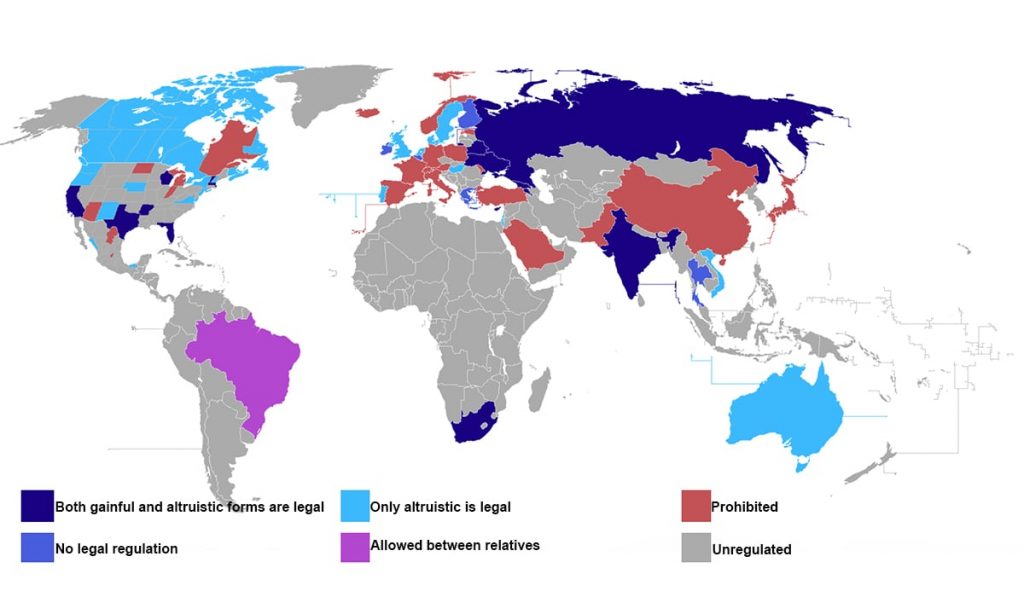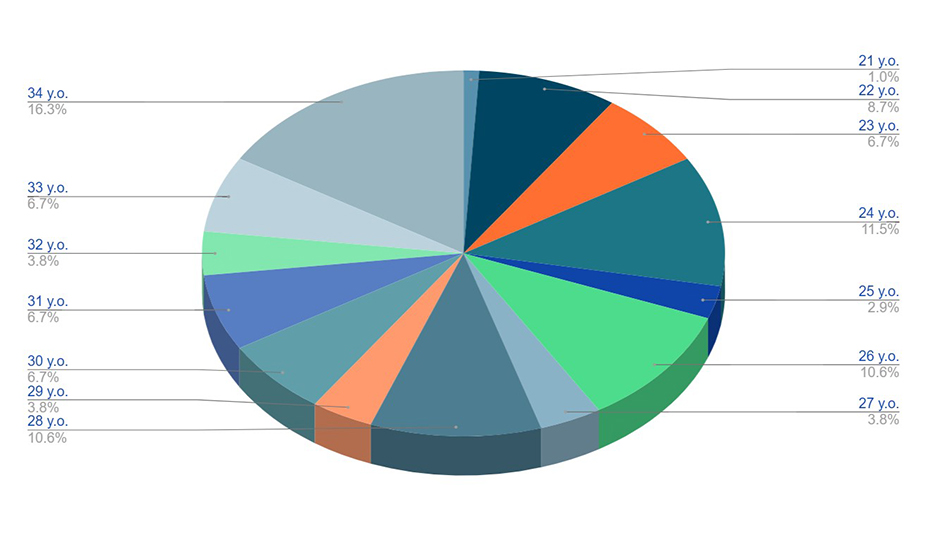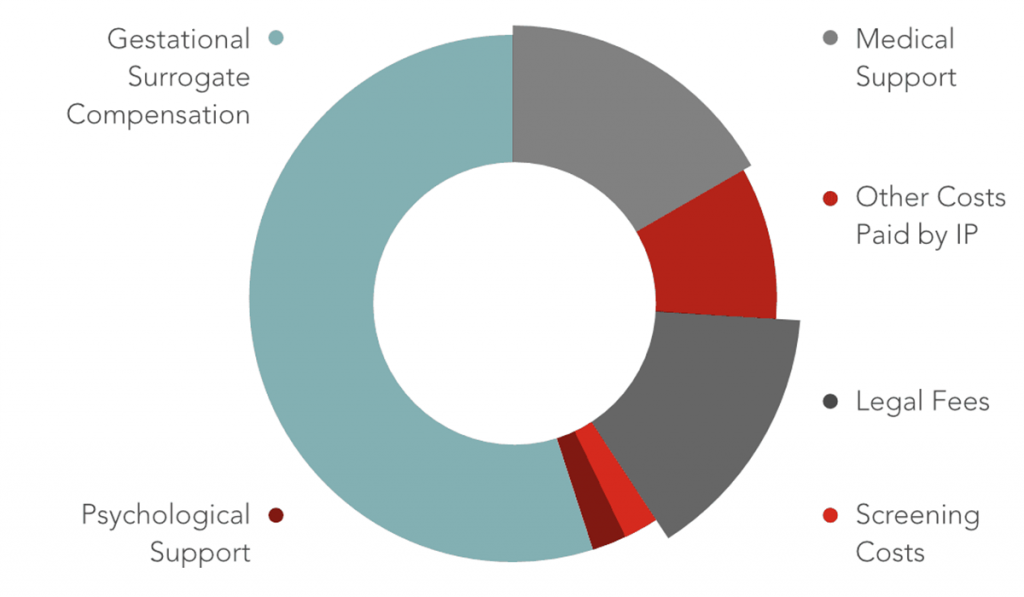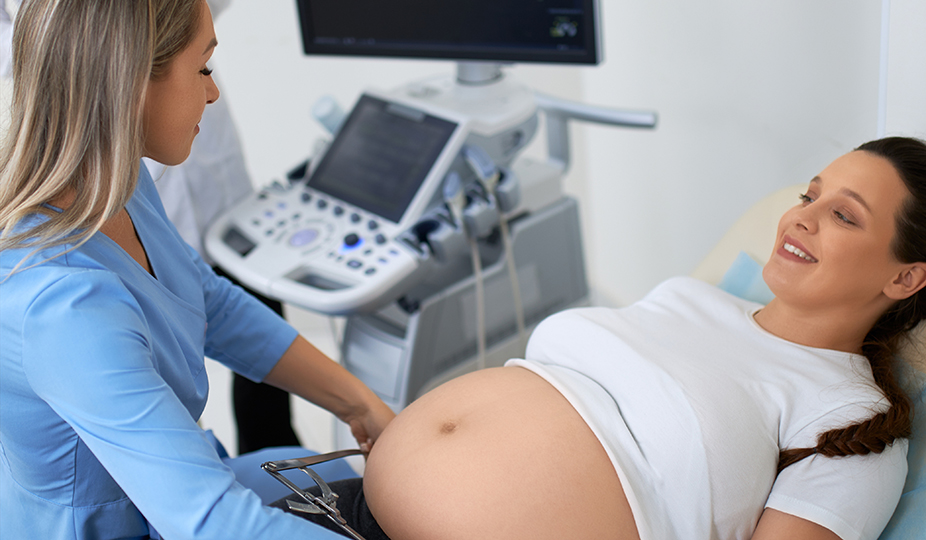Gestational Surrogacy Cost, Process, Statistics, and Laws Explained
There are two types of surrogate motherhood – traditional and gestational. During gestational surrogacy (full surrogacy), the surrogate mother has no biological connection with the child. Doctors use the oocyte of an egg donor or an intended mother, and conception occurs outside her body. After this, the doctors transfer the fertilized egg to another woman’s uterus. During traditional surrogacy (partial), the surrogate mother’s egg gets fertilized with the sperm of the biological father. Therefore, she is both an egg donor and a carrier.

Surrogacy, i.e., substitutionary motherhood, is a technology of human reproduction. A woman, i.e., a surrogate mother, voluntarily agrees to become pregnant to bear, give birth, and give a newborn baby to other people – its legal parents. There is no representative statistical data on surrogacy, but according to indirect unofficial estimates, more than 220 thousand children were born with the help of surrogate mothers in the world. Real statistics are much higher; there are no exact numbers due to moral and legal obstacles.
While most assistive reproduction programs involve the participation of two parties – the intended parents (a parental couple, single man or woman) and the reproductive clinic, surrogacy requires the active participation of a third person – a woman carrying a baby. It makes surrogacy programs difficult for legal regulation and complicates their practical application.
Gestational Surrogacy Laws, Degree of Admissibility, and Regulation Methods
In some countries, such as Germany and France, the government believes that surrogacy infringes on women’s self-esteem because someone is using them for their purposes. Therefore, surrogacy is prohibited there.
In other countries, such as Britain, they explain this phenomenon as a gift from one woman to another – and allow surrogacy only on a non-commercial basis. Ukraine, Russia, and some US states, including California, allow commercial surrogacy services. A woman has the right to decide whether she wants to become a surrogate mother or not. In some countries, such as Kenya and Nigeria, surrogacy is not regulated by law.

Because of these differences in regulations, surrogacy has become a popular form of medical tourism. Suppose the law prohibits surrogacy in a particular country (or there are significant restrictions). In that case, those wishing to have a child can go where the rules are milder or where this process is not regulated in any way.
Surrogacy Laws by Country
Not all countries officially allow surrogacy; some countries allow only gestational non-commercial surrogacy, some prohibit all surrogacy types, others do not have special laws that regulate surrogacy. We have created a table to show what countries allow gestational surrogacy according to IFFS Surveillance 07.
| Regulation extent and ways | Allowed | Not Allowed | Not mentioned in law or non-regulated |
|---|---|---|---|
| State reproductive legislation | United Kingdom, Greece, Israel, Canada, Netherlands, New Zealand, Russia, in Hungary and Hong Kong it is allowed but not applied | Austria, Vietnam, Germany, Denmark, Spain, Italy, Latvia, Norway, Slovenia, Taiwan, Tunisia, Turkey, France, Switzerland, Sweden | Belgium, Bulgaria, Korea, Czech Republic, there are no statistics related to Saudi Arabia |
| Industry regulation | Australia, Brazil, India, USA, Thailand, South Africa | Argentina, Egypt, Singapore, Croatia, Philippines, Japan, not applicable in Morocco | Ireland, Mexico, Chile, there is no available statistics for China and Lithuania |
| No special regulation | Colombia, Peru, Romania, Ecuador, Finland | Venezuela, Jordan, Malaysia, Portugal, Uruguay |
The appearance of new assisted reproductive technologies determines the legal aspect of the rights and relations between ‘legal’ parents and ‘genetic’ (biological) parents (a surrogate mother). The most important question is who is the genuine mother of a child born to a surrogate mother.
Each country solves it differently. For example, it can be only a woman who carried the child, a woman who owns a fertilized egg, a person or couple who use donor eggs, and a third-party surrogate mother during the program. Such a variety of approaches is associated with the traditions of a particular country, the strictness of their reproductive regulation norms, and the citizens’ law-abidingness. Therefore, in some countries, surrogacy may be allowed in some regions and prohibited in others. Examples are different states of the USA and Australia.
The US States that Allow Gestational Surrogacy
The US state of California is considered the world center for commercial surrogacy and a prominent international fertility services area. In 1992, the California legislature concluded that surrogacy contracts were consistent with a public conscience and therefore passed the Commercial Surrogacy Bill, endorsing the principle that all rights about a child born with the help of a surrogate mother belong to its genetic parents.
Favorable legislation in Arkansas, where the contract for services to the surrogate mother is binding, the parents (or one parent), i.e., the customers appearing in the agreement, are recorded in the birth certificate of the child born by the surrogate mother without legal delay.
The law considers the intention of the parents expressed in the contract to be the main factor, thanks to which the `surrogate` child is born. Therefore any legal disputes for the child are impossible. If the parents divorce a few years after the child`s birth, the court chooses one of the parents, despite any relations to the surrogate mother. Here, both single men and single women can hire surrogate mothers to have a baby. Even if there is no biological connection between parent and child, they record the ordering parent on the birth certificate as a single parent.
Thus, the implementation of surrogacy as an ART program to increase the number of births strongly depends on the legal basis. Particularly difficult are the issues of motherhood recognition, the solution of which in favor of genetic parents expands the scale of ART and opens up access to world markets for this medical service.
Gestational Surrogacy Statistics
Research and a specialized questionnaire of 13512 surrogate mothers made it possible to determine the main characteristics of the surrogate mothers offering their services.
Most (71%) of potential surrogate mothers are over 25 years old, and half of them are about 30. Here is a simple chart showing the age distribution of women offering their services as surrogate mothers.

65% of the surrogate mothers had one child before the program; the rest had two kids; there are also large families – ten of them had three children, and one surrogate mother has four kids. The oldest children are less than 14 years old, and the smallest is about a year (14.2% of the total number in aggregate). The majority of children are between 2 and 5 years old (66.3% of surrogate mothers). 2/3 of potential surrogate mothers are married; they are twice more likely than unmarried mothers to have more than one child (35.8% versus 18.5%).
Some women immediately declare their consent (7.5%) or disagreement (3.8%) to travel during the pregnancy.
15% of women already had surrogacy experience (one of them was a surrogate mother three times, another one participated in a surrogate program twice). They are ready to provide appropriate certificates, recommendations, and guarantees from biological parents and reproductive clinics. 30% Carried out the necessary tests to confirm their readiness and suitability for the program. Two women previously took part in other ART programs (egg donation); one, on the contrary, emphasized that she only agreed to full surrogacy, categorically refusing other ART programs.
Labor motivation does not exclude a moral and emotional component – thirty women indicated that they liked small children and the state of pregnancy. Twenty mentioned that they were happy to help other families.
20% of women emphasized their responsible attitude to the upcoming surrogate pregnancy, the absence of bad habits (smoking, alcohol, and drug use), and noted the education level in their profiles.
Gestacional Surrogacy Cost

The desired payment for services varies from $10000 to $40000. Sometimes surrogate mothers indicate additional monthly support costs (usually about $150) to spend on an apartment rental.
To give you a better understanding of the total contract cost, we list the estimated price for a program in Ukraine.
Prices for Surrogacy Contract in Kyiv, Ukraine
- Surrogacy contract (with ready embryos) $44900
- Surrogacy contract with IVF and egg donor from Sunshine $52900
- Surrogacy contract with IVF and VIP egg donor from Sunshine $54900
- Guaranteed surrogacy contract $62900
Surrogacy and Migration
Migration can be one of the surrogacy components. Women often need temporary relocation due to the ethical or legal component of the process. A woman who wants to become a surrogate mother, but lives in a region where commercial surrogacy is prohibited, can move to a different country to live in during pregnancy and childbirth. The analysis of the questionnaires confirmed the conclusions obtained from other studies of local surrogacy markets conducted at the initiative of reproductive clinics.
By many parameters, such as attitude to social approval, adaptability, neuropsychic stability, and behavioral regulation, potential surrogate mothers are more mentally stable, tolerant, ethical, conflict-free, not prone to suspiciousness and exaggeration of problems than representatives of other types of maternal behavior.
By their estimates, surrogate mothers feel great during pregnancy; they like the process of carrying a child, they have no fears associated with pregnancy. Most of the motivation is material, i.e., they, including mothers with many children, considered surrogacy the most acceptable type of employment for themselves.
Is Surrogacy a Job?
The commercial components of the program are regulated by laws that prohibit or allow payments to surrogate mothers, which significantly changes the potential number of such women and the motivation for their activities. But in any case, today’s surrogate motherhood is one of the ART performed only for medical reasons. It is not permissible in any case of social infertility caused by the unwillingness of a healthy woman to bear a child.
Commercial surrogacy is a type of female employment and a way of applying female labor, evidenced by the growing number of offers to become a surrogate mother. Against the background of discussions about the moral and ethical aspects of surrogate motherhood, women themselves, carrying someone else’s child, treat it as a regular job. They receive satisfactory payment for it and are often ready to do it repeatedly. By its nature, this payment is rather a kind of economic rent, i.e., payment for a strictly limited quantitatively resource, than wages as a modified form of labor cost. In practice, this means shifting all costs to legal parents – in contrast to other ART, which the state can fully or partially fund.
Surrogacy Programs Financing

Clinics interested in attracting clients are developing their ways of financing the program, turning to the services of charitable organizations, sponsors, about which they widely inform the public:
- financing the surrogate mother program to improve the demographic situation;
- implementation of programs designed to help infertile families to have children;
- implementation of charitable programs and projects aimed at creating a favorable legal and informational field around families participating in the surrogate mother program;
- attracting voluntary donations from legal entities and individuals in the form of monetary and material resources for the implementation of IVF programs;
- conducting charity events to finance low-income married couples to pay compensation for the surrogate mother services;
- implementation of funding for the surrogate mother program for low-income families in public and private medical clinics for human reproduction.
Gestational Surrogacy FAQ
Gestational is a type of surrogacy that occurs when a woman’s fertilized egg is placed in the uterus of a third-party surrogate mother. On the contrary, a surrogate mother is both an egg donor and a baby carrier during traditional surrogacy. Thanks to this technology, people who cannot naturally have a child can become parents. At the same time, they do not need to engage in a long and extremely difficult adoption process.
The desired payment for services varies from $10000 to $40000. Sometimes they indicated additional monthly support costs (usually about $150) to spend on an apartment rental. The cost for a full surrogacy program starts from $45000, or $62900 for a guaranteed surrogacy contract.
First, the intended parents participate in an IVF program and fertilize the woman’s oocytes in a clinic. After that, embryologists pick the best embryos and transfer them into the uterus of a surrogate mother who carries and gives birth to a baby. Therefore, a surrogate mother doesn’t have a biological connection to a baby.
A surrogate mother is the main person who participates in the process. She can carry one or several babies at a time. Another party is an egg donor who provides oocytes for the program or an intended mother. The third party is a sperm donor or an intended father. Therefore, any gestational surrogate program implies at least three people who can contribute.
Summing It Up
Surrogacy is a real step for people with fertility problems. These days, surrogate services used by celebrities such as Sarah Jessica Parker and Kim Kardashian are available to anyone who want to become a happy parent. Contact us if you have any questions regarding egg donors or a surrogate mother for your child, as well as the cost of services in your country. At the moment, we have 5-10 candidates who are ready to start the program. The expert consultancy is completely free; we are here to help you start your fertility journey.